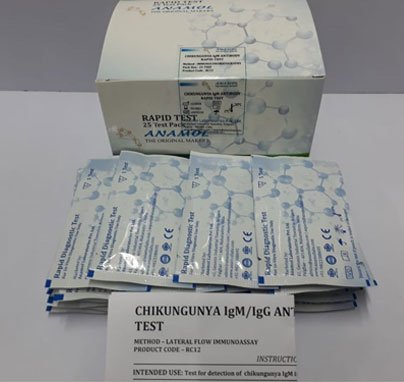CHIKUNGUNYA (IgG/IgM) CARD
Intended Use:
Test for qualitative detection of Chikungunya IgG/IgM in human serum, plasma and whole blood samples.
Introduction:
Chikungunya is a rare viral infection transmitted by the bite of an infected Aedes aegypti mosquito. It is characterized by a rash, fever, and severe joint pain (arthralgias) that usually lasts for three to seven days. The name is derived from the Makonde word meaning ‘that which bends up’ in reference to the stooped posture developed as a result of the arthritic symptoms of the disease. It occurs during the rainy season in tropical areas of the world, primarily in Africa, South-East Asia, southern India and Pakistan. The symptoms are most often clinically indistinguishable from those observed in dengue fever. Indeed, dual infection of dengue and chikungunya has been reported in India. Unlike dengue, haemorrhagic manifestations are relatively rare and most often the disease is a self-limiting febrile illness. Therefore, it is very important to clinically distinguish dengue from chikungunya infection. Chikungunya is diagnosed based on serological analysis and viral isolation in mice or tissue culture. An IgM immunoassay is the most practical lab test method
Chikungunya IgG / IgM Card

| Pack Sizes | 25 Test. 50 Test |
| Kit components | Test Device Assay Buffer Instructions for Use |
| Test Procedure | Qualitative only |
| Sample Type | Whole Blood, Serum or Plasma |
| Kit dimensions | 25 test – 75x150x110 mm. 50 test – 75x275x135 mm |
| Approx. weight of kit | 25 test – 150 gms. 50 test – 300 gms |
| Storage Temperature | Room Temperature |
| Shelf life | 24 months |
| Production Capacity | 600 mn ml per annum |
